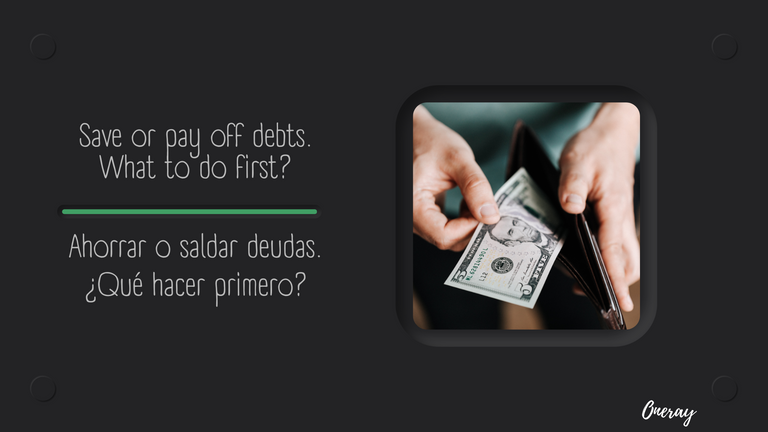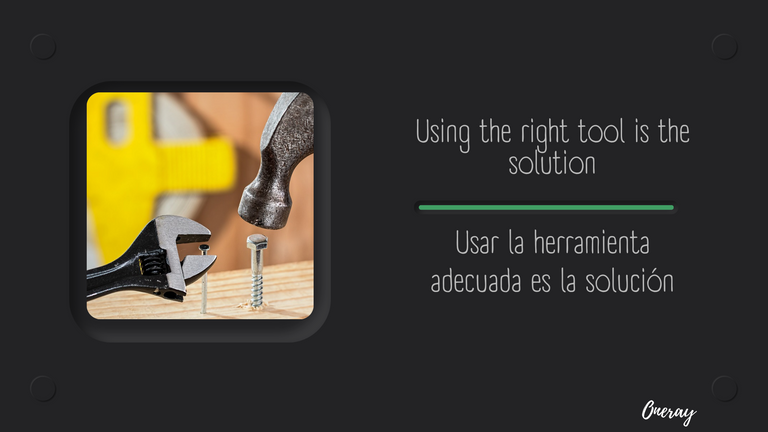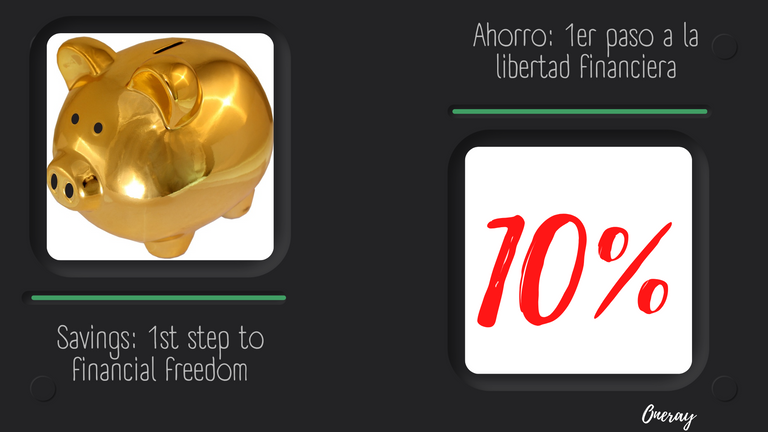For many people who are submerged in debt, this is the most frequent question they ask themselves when they have money in their hands, the product of their work effort.
I believe that it is a great responsibility to make decisions and that they are correct, or at least, there is a minimum margin of error since the human being is characterized by living under trial and error and not by the advice of other people with experience checked on the topic.
Why try to invent warm water or black thread if both exist? Well, in this case, I will share my own experiences on this topic, and you will decide if you contribute to making your own decisions.
Para muchas personas que están sumergidas en las deudas, esta es la pregunta más frecuente que se hacen al momento de tener dinero en las manos, producto de esfuerzo de su trabajo.
Creo que es una gran responsabilidad tomar decisiones y que estas sean acertadas, o al menos, haya un margen mínimo de error, ya que el ser humano se caracteriza por vivir bajo el ensayo y error y no por el consejo de otras personas con la experiencia comprobada en el tema.
¿Por qué tratar de inventar el agua tibia o el hilo negro si ambas cosas existen? Bien, en este caso, compartiré mis propias experiencias en este tema y ustedes decidirán si contribuyen a tomar sus propias decisiones.
Many experts point out that the most important thing is to pay the debts first, since these produce an interest higher than the interest generated by having money saved in the bank. Makes sense, doesn't it?
However, when the debt is large, it becomes very difficult to pay it in the short term unless all the money generated is used for this purpose. In this case, the other expenses should be covered by someone else, which doesn't make much sense either, because who would spend their money on a person who doesn't have the ability to support himself? For my part, I have never considered paying my debts by giving up the habit of saving.
Muchos expertos señalan que lo más importante es pagar las deudas en primer lugar, ya que estas producen un interés superior al interés generado por tener dinero ahorrado en el banco. ¿Tiene sentido, no?
Sin embargo, cuando la deuda es grande se hace muy difícil pagarla en el corto plazo a menos que todo el dinero generado se destine a este fin. En este caso, los otros gastos deberían ser cubiertos por otra persona, lo cual no tiene mucho sentido tampoco porque, ¿Quién destinaría su dinero en una persona que no tiene la capacidad de mantenerse a sí misma? Por mi parte, nunca he considerado pagar mis deudas dejando de lado el hábito del ahorro.
It is necessary to highlight that creating the habit of saving is one of the most difficult things to acquire. As we know, to fix a habit in us, we must replace it with another habit that does not seem right to us or that threatens our financial health.
George Clason, author of the book The Richest Man in Babylon, published in 1926, explains in his narrative that this, and only this, is the main habit to acquire to generate wealth.
He explains that we must make the decision to fill our bags (referring to the leather bag that in Babylonian times was used to store all the coins earned) and for this, it is necessary to set aside 10% of our income, therefore, saving must be made an irreplaceable habit to achieve the dream of financial freedom longed for by almost everyone.
Es necesario resaltar que, crear el hábito del ahorro es una de las cosas más difíciles de adquirir. Como sabemos, para fijar un hábito en nosotros, debemos sustituirlo por otro hábito que no nos parece correcto o que atente en contra de nuestra salud financiera.
George Clason, autor del libro El Hombre más rico de Babilonia, publicado en 1926, explica en su narrativa que este, y solo este, es el principal hábito a adquirir para generar riquezas.
Él explica que, hay que tomar la decisión de llenar nuestras bolsas (haciendo referencia a la bolsa de cuero que en los tiempos de Babilonia se usaban para guardar todas las monedas ganadas) y para esto, es necesario apartar un 10% de nuestros ingresos, de manera que, hay que hacer del ahorro un hábito insustituible para alcanzar el sueño de la libertad financiera anhelado por casi todo el mundo.

Without a doubt, we will make many mistakes when starting this saving project. I did them myself, regardless of what I had read or been advised to avoid losing money. You also learn the hard way, said the writer.
The best decision I made was that, despite the debts I might have, I did not give up the habit of saving as much as I could. When I started doing it, I only had the ability to save 3% of my income. I couldn't take it anymore, since what I barely earned was enough for my expenses. I saved, I paid and with what I had left, I bought food. It wasn't easy at first, but I was able to keep it up for a long time, since I was also able to discover that there were things I was spending money on that weren't necessary for living.
As I cut out unnecessary spending, I was able to save more and pay off my debt faster, which made me feel so much better. At this point I have already shared with you two things that I did to have financial stability, I still do not achieve the freedom that I want, but I am on the way to achieving it.
The first thing I did was set aside a percentage of everything I earned and save it; This is the first step to follow, and the second, which is just as important as the first, is to learn to control my expenses... I'll talk about this in my next post.
Sin duda, cometeremos muchos errores al iniciar este proyecto de ahorrar. Yo mismo los hice sin importar lo que había leído o lo que me habían aconsejado para evitar perder dinero. También se aprende a golpes, dijo el escritor.
La mejor decisión que tomé fue que, a pesar de las deudas que podía tener, no dejé de lado el hábito de ahorrar lo que más podía. Cuando comencé a hacerlo, solamente tenía la capacidad de ahorrar un 3% de mis ingresos. No podía más, ya que lo que ganaba a duras penas me alcanzaba para los gastos. Ahorraba, pagaba y con lo que me quedaba, compraba comida. No fue fácil al principio, pero pude mantenerme así por un buen tiempo, puesto que también pude descubrir que había cosas en las que gastaba dinero y que no eran necesarias para vivir.
A medida que dejaba de lado los gastos innecesarios, podía ahorrar más y saldar mis deudas más rápido, cosa que me hizo sentir mucho mejor. En este punto ya les he compartido dos cosas que hice para tener estabilidad financiera, aún no alcanzo la libertad que quiero, pero estoy en el camino a lograrlo.
Lo primero que hice fue apartar un porcentaje de todo lo que me ganaba y ahorrarlo; Este es el primer paso a seguir, y lo segundo, que es tan importante como lo primero es aprender a controlar mis gastos... de esto les hablaré en mi siguiente publicación.

Tal vez no todos somos grandes escritores, pero estoy seguro de que siempre tenemos algo que contar. Oneray
Perhaps not all of us are great writers, but I'm sure we always have something to say. Oneray



Living debt free makes such a psychological difference - and to your quality of life in general (well, for me anyways)
I do both. Pay off debts while also investing in things like Bitcoin, Dogecoin, Blurt, Steem, HBD, SPS, and other cryptos that will some day go up.
You've been curated by @world-Travel-Pro!
Thank you for contributing to the Blurt Blockchain!
Keep up the great work!
Congratulations, your post has been curated by @dsc-r2cornell. You can use the tag #R2cornell. Also, find us on Discord
Felicitaciones, su publicación ha sido votada por @ dsc-r2cornell. Puedes usar el tag #R2cornell. También, nos puedes encontrar en Discord
I also read the book too and that was where I learned that 10% of what I earn is mine to keep. Saving or paying off debt, which one should come first? For me, I rather use one stone to kill two birds by minimizing how much I spend on expenses. There are some unnecessary expenses that need to be cut off so we can do both together and we are on our way to financial stability. While you have your income, after removing whatever percent you can for savings, reduce the cost of expenses and use the remaining to pay off your debt bit by bit until you have finished paying. With this, you won´t be missing out on savings.
Greetings,
Also, keep in touch with Blurtconnect-ng family on Telegramand Whatsapp
Peace